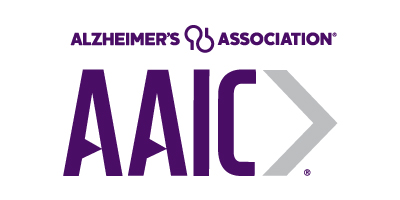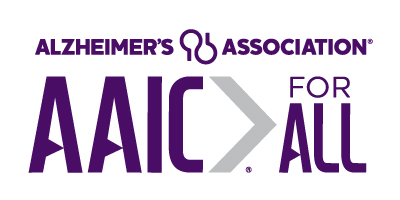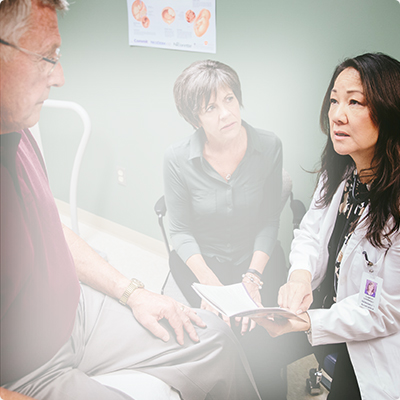Continuing Education on Alzheimer's and Dementia
The Alzheimer's Association offers continuing medical education on Alzheimer's and dementia, including free CE options. These resources help physicians, radiologists, neurologists, nurses, advanced practice nurses, physician assistants, psychiatrists, social workers, pharmacists and other clinicians to remain current in this fast-changing field.
Conferences offering CME on Alzheimer's and dementia
Alzheimer's Association International Conference® (AAIC®)
 The Alzheimer's Association International Conference (AAIC) is the largest and most influential international meeting dedicated to advancing dementia science. Each year, AAIC convenes the world’s leading basic science and clinical researchers, next-generation investigators, clinicians and the care research community to share research discoveries that will lead to methods of prevention and treatment and improvements in the diagnosis of Alzheimer’s disease. AAIC 2025 will take place in Toronto and online, July 27-31, 2025.
The Alzheimer's Association International Conference (AAIC) is the largest and most influential international meeting dedicated to advancing dementia science. Each year, AAIC convenes the world’s leading basic science and clinical researchers, next-generation investigators, clinicians and the care research community to share research discoveries that will lead to methods of prevention and treatment and improvements in the diagnosis of Alzheimer’s disease. AAIC 2025 will take place in Toronto and online, July 27-31, 2025.
Continuing education credits are jointly provided by Postgraduate Institute for Medicine (PIM) and the Alzheimer’s Association.
Credits: AAIC 2025 offers a maximum of 26.75 continuing education credits.
Expiration: Sept. 1, 2026
Cost: Continuing Education credits are free for ISTAART members and available to non-ISTAART members for $100.
Audience: Biochemists, geriatric psychiatrists, geriatric specialists, molecular and cell biologists, neurologists, neuroscientists, nurses, pharmacologists, primary care physicians, psychiatrists, psychologists, radiologists and social workers.
AAIC For All: Clinicians
 Learn the latest findings in Alzheimer's and dementia research at this no-cost, single-day event specifically designed for clinicians and dementia health care professionals. AAIC For All: Clinicians will showcase research highlights from AAIC 2025 events and will expand your knowledge of dementia diagnosis, treatment, risk reduction, and dementia care.
Learn the latest findings in Alzheimer's and dementia research at this no-cost, single-day event specifically designed for clinicians and dementia health care professionals. AAIC For All: Clinicians will showcase research highlights from AAIC 2025 events and will expand your knowledge of dementia diagnosis, treatment, risk reduction, and dementia care.
Hosted as a hybrid event — live in-person in Toronto on July 31 and online — participate in this flexible program at your own pace and enjoy 30-day on-demand access to AAIC For All materials through the virtual platform. Attendees can earn Continuing Medical Education (CME) and Continuing Education (CE) at no cost.
Credits: AAIC For All: Clinicians offers a maximum of 26.75 continuing education credits.
Expiration: Sept. 1, 2026
Audience: Biochemists, geriatric psychiatrists, geriatric specialists, molecular and cell biologists, neurologists, neuroscientists, nurses, pharmacologists, primary care physicians, psychiatrists, psychologists, radiologists and social workers.
Webinars and other free online CME opportunities
An Introduction to Amyloid-Related Imaging Abnormalities (ARIA) and Its Management
Continuing Medical Education Catalog
See all available continuing education and register.
With the Food and Drug Administration’s approval of a first-in-class anti-amyloid therapeutic, the management of amyloid-related imaging abnormalities, or ARIA will move into clinical practice. Clinicians and radiologists are required to assess and mitigate ARIA risk, identify ARIA in its multiple presentations and manage ARIA. This CME course will explain the phenomenon of ARIA, along with its epidemiology, presentation, prognosis and management. Attendees will also review case studies.
Upon completing this session you will be able to:
-
Differentiate between ARIA-e and ARIA-H.
-
Recognize risk factors and understand what determines the evolution and course of ARIA.
-
Implement recommendations for appropriate clinical management of ARIA.
Credits: 1 hour AMA PRA Category 1 Credit™
Expiration: July 1, 2026
Audience: All medical professionals, especially physicians, nurse practitioners, physician assistants, neurologists, psychiatrists, psychologists and radiologists.
Dementia Clinical Care Education Series
This four-part continuing education video series outlines strategies for dementia care including: epidemiology, diagnosis, assessment and mild cognitive impairment. Concluding with case presentations for real-world application.
Credits: .5 hour AMA PRA Category 1 Credit™ per module (4 modules total)
Expiration: Oct. 19, 2025
Audience: Primary care clinicians including internists, family physicians, radiologists, neurologists, nurse practitioners and physician assistants who are seeking additional education in the assessment, diagnosis and ongoing health care of patients with cognitive impairment and dementia.
Modifiable Risk Factors for Dementia Microlearning Series
This eight-part microlearning video series will address the topic of modifiable risk factors, lifestyle and behaviors that can reduce or increase a person’s chances of developing dementia. This series will outline evidence-based risk reduction interventions for dementia focused on:
- Physical activity.
- Diabetes/obesity.
- Vascular risks.
- Tobacco use.
- Traumatic brain injury.
- Diet and nutrition.
- Cognitive engagement.
- Sleep.
Credits: .25 hour AMA PRA Category 1 Credit™ per module (8 modules total)
Expiration: Feb. 14, 2027
Audience: Primary care clinicians including internists, family physicians, radiologists, neurologists, nurse practitioners, physician assistants, nurses and pharmacists who are seeking additional education in the assessment, diagnosis and ongoing health care of patients with cognitive impairment and dementia.
The Alzheimer's and Dementia Care ECHO® Program
The Alzheimer's and Dementia Care ECHO Program is a free, case-based telementoring program that uses videoconferencing technology to connect dementia experts with primary care teams to spread best-practice guidance for dementia detection, diagnosis and management. Participants have the ability to earn up to 12 free CME/CNE/CEUs through participation in the live sessions.
Credits: 1 hour/session, up to 12 hours
Audience: Primary care clinicians and their care teams, professional care providers.
See the current Alzheimer's and dementia courses and webinars in the Continuing Medical Education Catalog.
Other professional development
These events, webinars and trainings will be of interest to medical professionals, care professionals and the Alzheimer's research community.
- ALZPro® is the central hub for professionals to find evidence-based, person-centered dementia resources from the Alzheimer’s Association.
- Webinars on dementia and Alzheimer's research
- Introduction to Alzheimer's and Dementia is an interactive course for providers, created in partnership with the American Medical Association. Learn about the impact of Alzheimer's, the difference between Alzheimer's and dementia, stages and risk factors, current research and treatments available for some symptoms and Alzheimer's Association resources.
- essentiALZ® — Alzheimer's Association Training and Certification: This training and certification on person-centered care practices offers continuing education credits for nursing, social work, physical therapy, psychology, occupational therapy and nutrition/dietetics professionals working in long-term care and community-based settings. For disclosure and accreditation information and to learn more, visit alz.org/essentiALZ-credit.
Questions? Contact education@alz.org.

Access clinical resources for dementia care.
See Resources
Access resources for your patients and their caregivers.
See Resources
